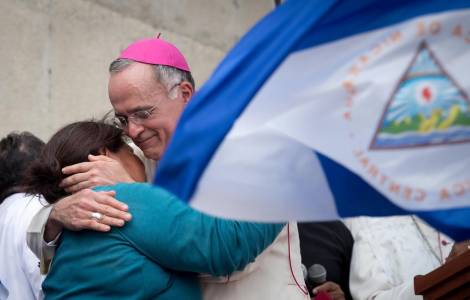
Managua (Agenzia Fides) - "I thank Pope Francis who, after confirming my ministry, has asked me to go to Rome for a period. I carry in my heart the joy, the pains and the hopes of my Nicaraguan people. Thank you all for your affection!": this is what Mgr. Silvio José Baez wrote yesterday, after the press conference during which he and Cardinal Leopoldo Brenes, Archbishop of Managua, informed that Mgr. Baez, Auxiliary Bishop of Managua, will go to work in Rome for a period. Mgr. Baez, as announced by Cardinal Brenes, will leave after the Holy Week celebrations.
The Carmelite Bishop expressed his sadness to leave Nicaragua: "It hurts me to leave, but my heart remains here and I will always be following (the situation in Nicaragua) closely".
There were many reactions to this news, which link this decision to the complex crisis that the country has been experiencing for a year. Former vice president of Nicaragua and writer Sergio Ramírez, defined the departure of Bishop Báez as a "forced exile", adding that he and all those who had to leave because of the socio-political crisis will return when democracy returns.
"Mgr. Báez will leave Nicaragua, but Nicaragua will not leave Báez", writes one of the thousands of the Bishop’s followers. Many believers and non-believers have expressed their closeness and support.
The political situation in Nicaragua is not going anywhere: the hope is that National Dialogue continues, based on the request of the Civic Alliance, which sets the release of all political prisoners as an inescapable condition. The Church, through the Apostolic Nuncio in Nicaragua, Archbishop Waldemar Stanislaw Sommertag, present as the only international witness, has always asked for the path of sincere dialogue to resolve the crisis.
The government does not see decisive steps to implement the agreements signed last March 29 with the Civic Alliance and to reach a final agreement. The requests of the opposition were not accepted: President Ortega to leave office, allow early elections and the release of all political prisoners (more than 600). This situation will also have economic consequences, with sanctions by the United States. International politics is waiting for "the anniversary" of the crisis (next April 18th) to see if democracy returns to Nicaragua, but the current situation does not leave much hope. Luis Almagro, Secretary General of the Organization of American States (OEA), launched on January 11 the process for the implementation in Nicaragua of the Democratic Charter of the American continent, with the support of the United States. (CE) (Agenzia Fides, 11/4/2019)